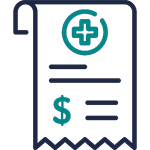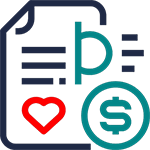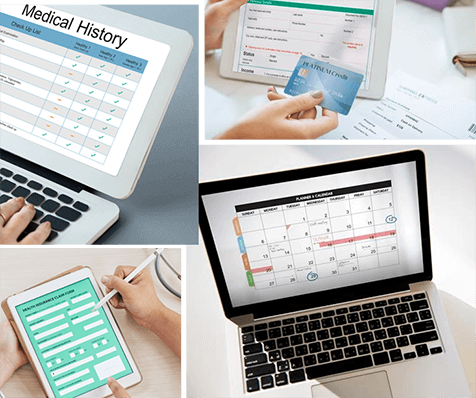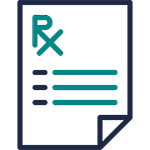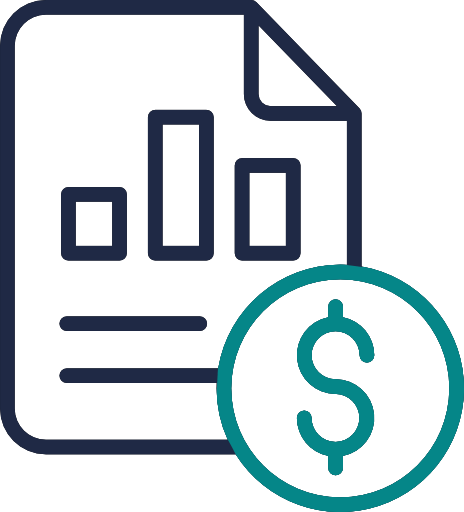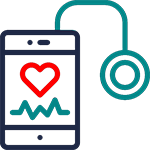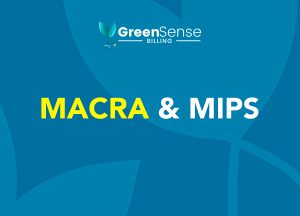CMS-1500 and UB-04 are the two types of medical billing forms in healthcare.
These forms are more than just paperwork. They are the lifelines to flawless revenue cycle management of the healthcare system.
In this article, we’ll decode the difference between cms 1500 and ub04 forms, their histories, importance, and impacts on healthcare billing.
Ready to get started? Let’s begin . . .
The Historical Journey
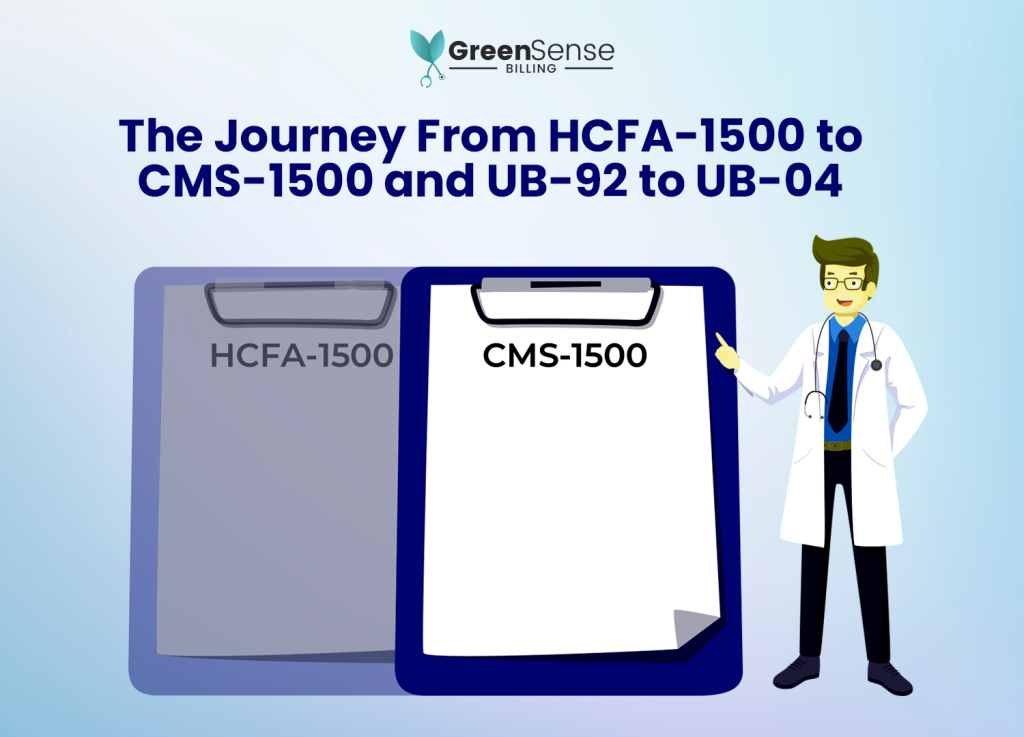
HCFA-1500 / CMS-1500
Born out of the need for standardized billing for Medicare and Medicaid in the 1970s, the HCFA-1500 form has been a cornerstone in healthcare billing.
With the evolution of medical practices, it underwent several changes, eventually becoming the CMS-1500 form.
Did you know that, as of 2019, approximately 1.2 billion claims were processed using the CMS-1500 form annually in the United States?
UB-04
The UB-04 form, stepping in for UB-92 in 2007, transformed hospital billing.
It caters to the complex nature of hospital services, from inpatient stays to outpatient procedures.
Interestingly, hospitals in the U.S. submit over 300 million claims each year using the UB-04 format.
CMS 1500 VS UB 04
The CMS 1500 and UB-04 forms are essential in the healthcare billing process. However, they serve different purposes and are used for distinct types of claims.
Here’s a table comparing UB04 VS CMS 1500.
| Feature | CMS 1500 Form | UB-04 Form |
| Purpose | Billing for medical services by non-institutional providers (e.g., doctors, therapists) | Billing for services by institutional providers (e.g., hospitals) |
| Used By | Individual healthcare providers like doctors, therapists, and ambulance services | Hospitals and other institutional facilities |
| Used By | Relatively straightforward, designed for single services or visits | More complex, suitable for multiple services and longer hospital stays |
| Key Focus | Focused on individual procedures or treatments | Tailored to cover a range of services during a patient’s hospital stay |
| Common Use | Medicare and insurance companies for outpatient services | Medicare and insurance companies for inpatient and outpatient services in a hospital setting |
| Form Structure | Simple, with specific sections for procedures, diagnoses, and provider information | Detailed, with sections for a wide array of hospital services and patient information |
Why Are CMS 1500 and UB04 Forms So Important?
Imagine a world where every healthcare provider used a different billing method – what chaos it would be! These standardized forms bring order and efficiency.
CMS-1500
Primarily used by physicians and therapists, this form ensures that around 90% of healthcare providers in the U.S. can accurately bill their services.
It’s pivotal for private practices, where even a small error can impact their revenue stream significantly.
UB-04 Forms
For hospitals, that cater to a vast array of services and patient needs, the UB-04 form is indispensable.
It accommodates the diverse billing requirements of over 6,000 hospitals in the U.S. alone.
The Contents: What’s In These Forms?
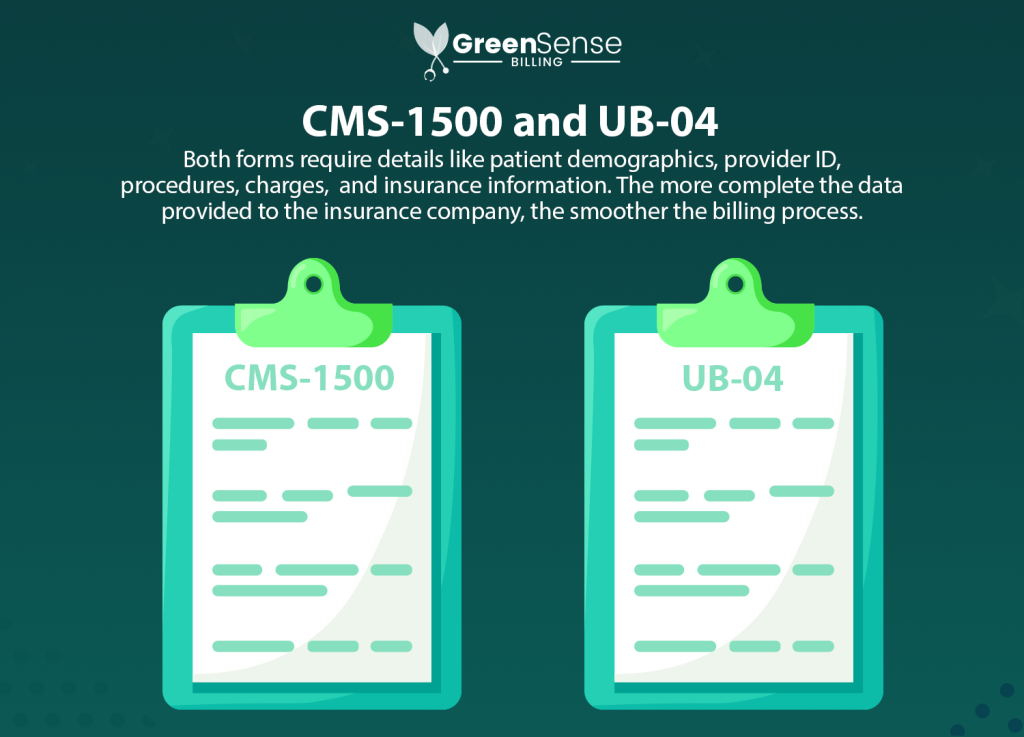
CMS-1500: This form includes patient information, insurance details, diagnosis codes (ICD), and treatment codes (CPT/HCPCS).
Note: A single coding error can lead to a claim denial, which happens in about 10% of medical claims.
UB-04: It’s more detailed, covering everything from patient demographics to detailed service breakdowns.
UB-04 is crucial for hospital billing, where the average cost of a hospital stay can exceed $10,000, making accurate billing vital.
Errors in CMS-1500 & UB-04 Forms
Errors in CMS-1500 & UB-04 forms have real-world consequences.
Financial Impacts
Inaccurate billing leads to claim denials. The healthcare industry sees as much as $262 billion in claims denied annually, a significant portion due to billing errors.
Operational Efficiency
On average, it takes about $25 to rework a single claim. Multiply that by the number of errors, and the cost can be staggering for a healthcare provider.
Patient Experience
Incorrect billing can result in overcharging. A study showed that 80% of medical bills contain errors, often leading to patient dissatisfaction and trust issues.
The Deeper Impact of CMS-1500 and UB-04 in Healthcare Billing
Expanding our exploration into the world of healthcare billing, let’s delve deeper into the nuances and broader impacts of the CMS-1500 and UB claim forms.
Understanding these elements not only provides insight into the healthcare industry’s complexities but also underscores the importance of precision and efficiency in medical billing.
The Economic and Social Ripple Effects
Economic Implications: The healthcare industry, a significant segment of the economy, heavily relies on accurate billing.
In 2020, healthcare spending in the U.S. reached an astounding $3.8 trillion, or about 18% of the country’s GDP. Efficient billing practices directly influence the sustainability of healthcare financing.
Social Impact: Accurate billing extends beyond economics; it also affects patient trust and satisfaction.
A survey revealed that 61% of patients consider clear billing as a crucial factor in their overall healthcare experience.
The Role of Technology and Compliance
Technological Integration: With the advent of Electronic Health Records (EHRs) and advanced billing software, the process has become more streamlined.
In fact, practices using electronic methods have seen a 30% reduction in billing errors.
Regulatory Compliance: The healthcare industry is heavily regulated, and these forms play a crucial role in maintaining compliance.
For instance, accurate CMS-1500 and UB-04 submissions are essential for meeting the requirements of the Health Insurance Portability and Accountability Act (HIPAA).
Healthcare Staff Training and Expertise
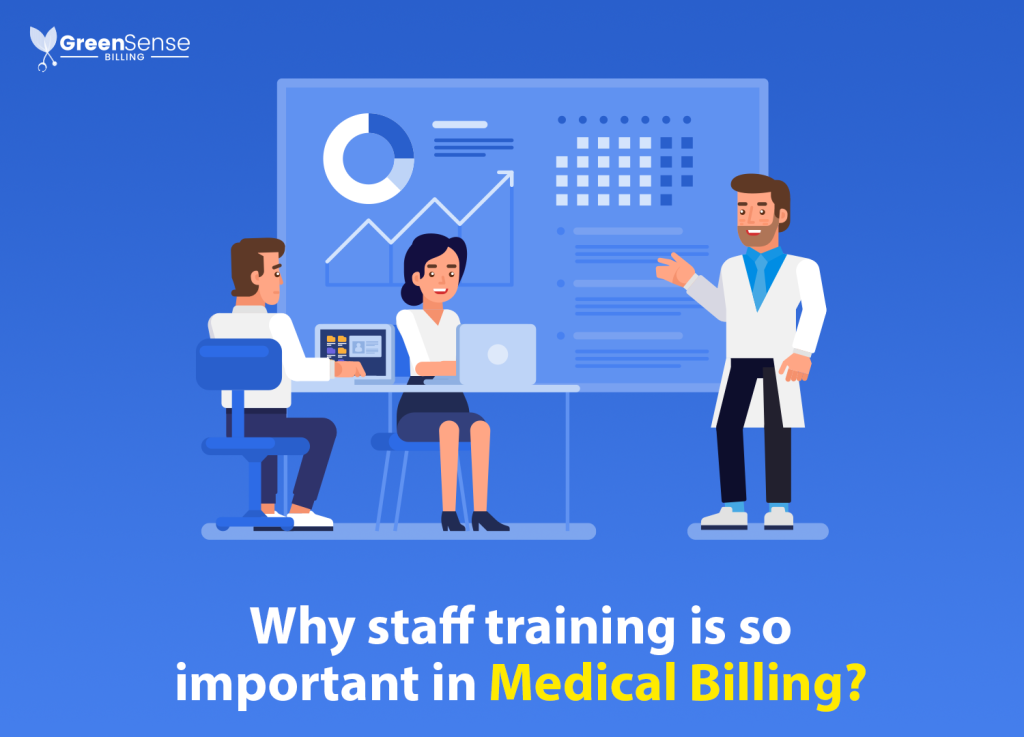
Professional Training: Billing specialists undergo rigorous training to master these forms. Their expertise not only impacts a healthcare facility’s revenue but also its operational efficiency.
Continual Education: As billing codes and regulations evolve, continual education becomes vital. For instance, the shift from ICD-9 to ICD-10 codes marked a significant change, requiring retraining of billing staff.
Looking Ahead: Innovations and Challenges
Future Innovations: AI and machine learning promise to further revolutionize healthcare billing, potentially reducing errors and improving efficiency.
Imagine a future where AI algorithms predict and prevent billing errors before they occur!
Challenges Ahead: Despite technological advancements, challenges like regulatory changes, coding updates, and cybersecurity concerns remain. Navigating this while maintaining accuracy and efficiency will be critical for the future of healthcare billing.
Q: What is the primary use of the CMS-1500 form?
A: It’s mainly used for non-hospital provider billing.
Q: Can the UB-04 form be used for outpatient services?
A: Yes, it’s used for both inpatient and outpatient hospital services.
Q: Are CMS-1500 and UB-04 forms submitted electronically?
A: Yes, both can be submitted electronically for efficiency.
Q: Do billing errors significantly impact healthcare costs?
A: Yes, errors can lead to substantial financial losses in healthcare.
Q: Has the introduction of EHRs reduced billing errors?
A: Yes, EHRs have contributed to a decrease in billing errors.
Q: Are CMS-1500 and UB-04 forms relevant for insurance claims?
A: Absolutely, they are critical for processing insurance claims.
Conclusion
CMS-1500 and UB-04 are the common 2 types of billing forms. They are not just administrative tools but vital components that support the financial and operational backbone of the healthcare system.
Their correct usage ensures economic stability, regulatory compliance, and patient satisfaction, ultimately contributing to the overall health and well-being of society.
So, how did you fare in the quiz? Your engagement and curiosity are key to understanding the vast and complex world of healthcare billing.
As we embrace future innovations and tackle upcoming challenges, the journey through this intricate landscape continues to be a fascinating and vital one.

